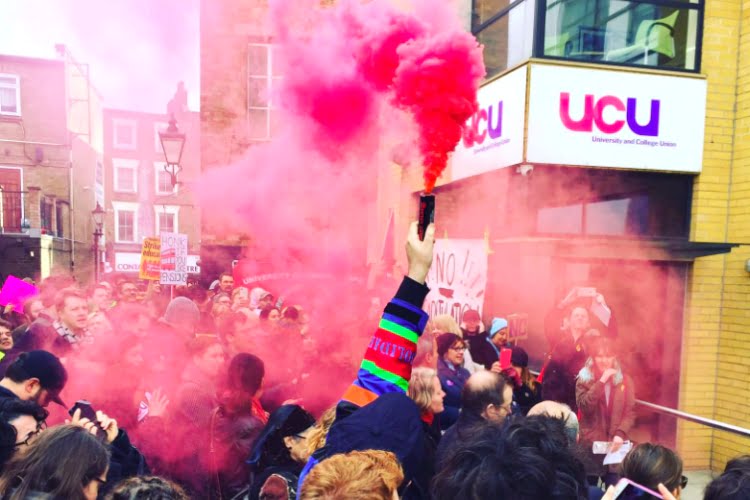Under pressure from union leaders, UCU members have accepted a derisory offer over pensions. Nevertheless, the struggle continues.
UCU members have voted 65 percent to 35 on a 64.5 percent turnout to accept the latest offer from Universities UK (UUK). This brings the current round of strikes to an end. But the fight is not over.
The recent vote result followed a criminally short ballot period, marked by deliberate misinformation from general secretary Sally Hunt and the union leadership.
There are a number of additional factors explaining this outcome: a lull in momentum during the Easter holidays; a certain exhaustion on the part of some members; difference in opinion between very active and radical branches (bolstered by new class fighters who cut their teeth on the picket lines) and a larger, less confident membership, etc.
Question of leadership
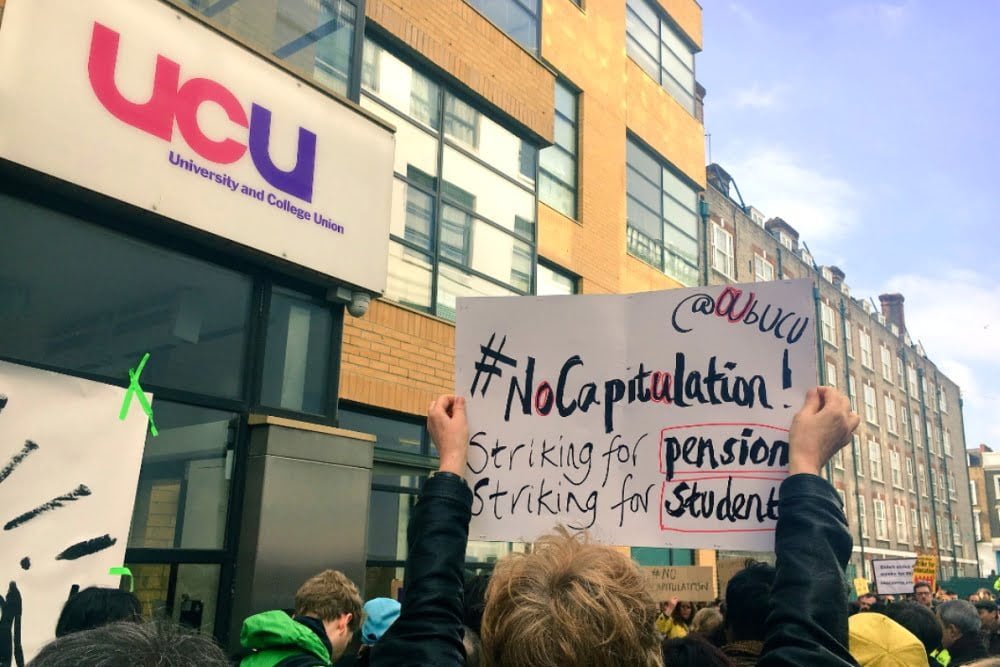 The most revealing aspect to come out of this deal, however, has been the behaviour of the union leadership, who did everything in their power to bring our action to a halt.
The most revealing aspect to come out of this deal, however, has been the behaviour of the union leadership, who did everything in their power to bring our action to a halt.
The recent ballot was called on the UUK’s offer for a new, ‘independent’ valuation of the USS pension scheme, which promises nothing but a “broadly comparable” set-up to the current arrangement. This is vague enough to mean literally anything.
And despite the vast majority of branches being in favour of either revising the offer or demanding a ‘no detriment’ (no cuts) clause, Sally Hunt went over the heads of elected negotiators and forced the membership to vote on the offer as it stood.
Members were given only a week to make up their minds about a deal that was, essentially, presented as a fait accompli by the leadership. This left precious little time for members to consider the offer or to campaign locally one way or the other.
Now, we have been left to the tender mercies of an “expert panel” consisting of the UUK, and the same HEC members who already tried to sell us out once.
Converge the struggles
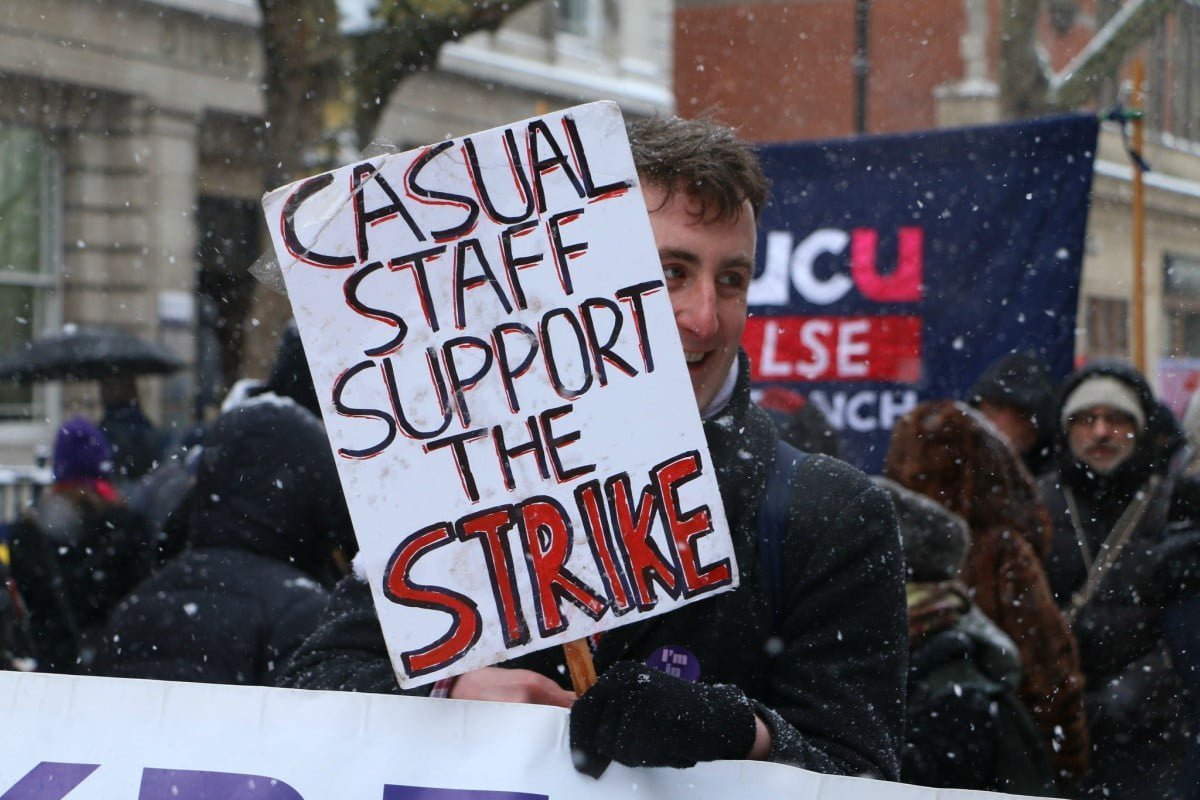 Despite the limited timeframe, Hunt still managed to send no fewer than four emails to the entire membership whipping a Yes vote (including one that arrived with the e-ballots), scaremongering about an apocalyptic scenario where we could be left with nothing.
Despite the limited timeframe, Hunt still managed to send no fewer than four emails to the entire membership whipping a Yes vote (including one that arrived with the e-ballots), scaremongering about an apocalyptic scenario where we could be left with nothing.
In one of these emails, Hunt warned that “further concessions or clarifications are unlikely without a substantial increase in industrial action – above and beyond the fourteen days already taken and the nineteen further days of strikes that many members are due to take between now and the end of June.” (Our emphasis)
The UCU general secretary is bang on the money. A “substantial increase in industrial action” is exactly what the union should have advocated for!
If we had escalated and extended the strike to encompass the broader issues of marketisation and free education, we could have easily linked our struggles with those of FE teachers, casualised workers, and students and mobilised for a sector-wide strike. This would have allowed us to tackle the fundamental questions that affect higher education: casualisation, wage cuts, and marketisation.
This would have opened the path to a wider, political struggle against Tory austerity, encompassing other public sector workers and students. We could have seen the kind of ‘convergence of struggles‘ building right now in France, for example, where massive general assemblies of students and academics are linking up their campaigns against Macron’s reactionary education policies with striking railway workers.
Instead, because of the narrow perspective of our union leadership, NUS bureaucrats, and student ‘activists’ (as we have explained elsewhere), our struggles have been kept divided; no broader political objectives have been meaningfully drawn; and now we have risked wasting all of our potential to change society.
From the beginning, Sally Hunt and co. were only interested in getting a bit more leverage in negotiation with the bosses, not in fighting to transform our sector – or to transform society. And transformation is desperately needed.
End of the beginning
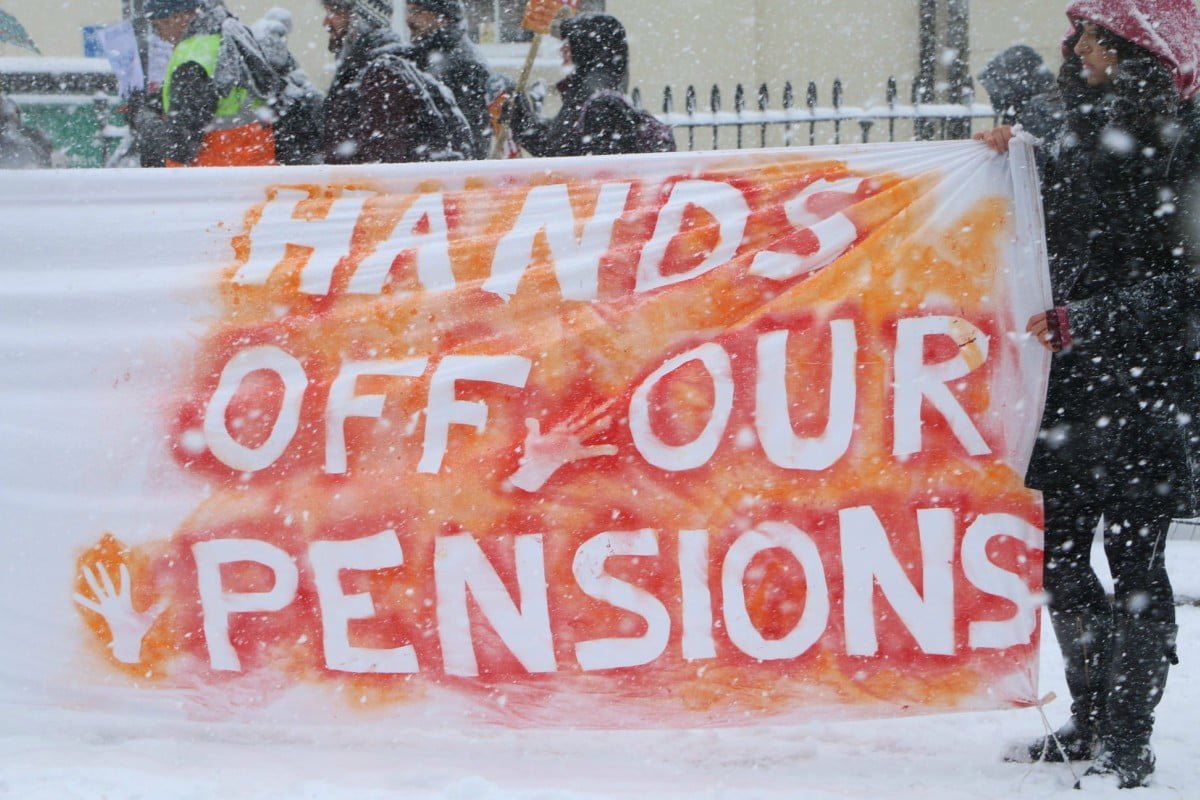 But this result is by no means the end. The ballot turnout was a record for the union, with 33,973 votes cast. Notably, every branch that held meetings and voted on a position on the ballot advised rejection. This layer constitutes the most engaged and radical members of the UCU.
But this result is by no means the end. The ballot turnout was a record for the union, with 33,973 votes cast. Notably, every branch that held meetings and voted on a position on the ballot advised rejection. This layer constitutes the most engaged and radical members of the UCU.
The grassroots activity generated within the union by this dispute marks a huge turnaround from just months ago, where branch meetings were tiny and moribund, with fighting energy nowhere to be seen.
Rank-and-file members must not be demoralised. Instead, we must trust in our own strength and organise to change the union from top to bottom. We must send as many militant delegates to the upcoming UCU congress as possible, and elect a leadership that will fight rather than capitulate at the first opportunity.
But we must also develop a perspective of linking up with other workers and students. Ultimately, this means taking our fight not just to the UUK, but to the capitalist system itself. It is this broken economic system, in the last analysis, that is the root cause of the crisis in education.
Model motion for UCU branches: the fight goes on – strike to defend education!
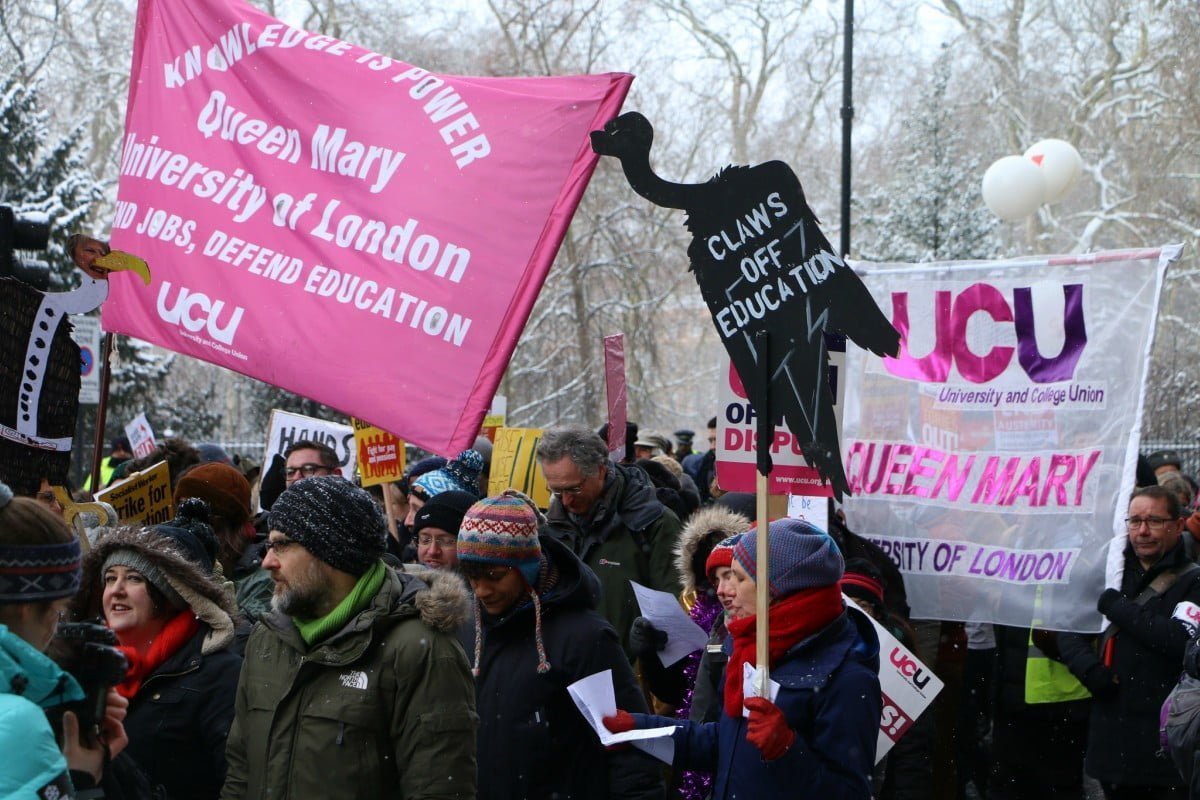 The congress notes:
The congress notes:
- The USS strike was the most successful action our union has ever taken, in terms of its scale, impact, and the bonds of solidarity we forged with students and other workers.
- Many UCU branches have drawn the conclusion that our fight to protect USS was part of a wider fight against the marketisation of education.
- Aside from the attack on USS, marketisation is evident in the lifting of the student intake cap in 2013, £9,000+ tuition fees, tightening research funding, corporatisation of governance, the introduction of the Teaching Excellence Framework (TEF), ballooning vice-chancellor pay, 16 percent pay cuts for teaching staff, mass casualisation and prioritising ‘student experience’ (i.e. impressing students at welcome events) over quality education.
- Marketisation is a political project flowing from a general crisis of capitalism, that subjugates education to market forces, destroying its status as a public good.
- Other education workers in FE are still on strike over pay; Unison previously asked its membership to strike over pension cuts; and casualised university staff have taken significant action across the country.
The congress believes:
- The strike has been suspended, following a campaign of anti-democratic, bureaucratic maneuvering by Sally Hunt and the UCU leadership; coupled with deliberate misinformation during a criminally short ballot period.
- Nothing fundamental about the dire straits of education has been resolved.
- Student/staff solidarity has proved effective in pressuring university management and the UUK. This unity of purpose would not have been possible had we failed to connect our struggle to marketisation and free education.
- The attack on USS was ultimately a political question. ‘De-risking’ is a nation-wide process in which employees are expected to shoulder more of the consequences of economic instability after 2008.
- Government cuts, austerity measures and attacks on collective bargaining victimise public sector workers in general, and education staff and students in particular.
- These cuts flow from an economic impasse – a generalised crisis of the capitalist system, which can no longer offer any reforms, only counter-reforms. The UUK is merely communicating this crisis.
- There is a lot of potential for joint action with other unions and students, building on the momentum we have gained thus far. We must defend our membership and sector with the widest possible action. The pension dispute is suspended, but there is a bigger fight on our hands, and we should strike while the iron is hot.
- Ultimately, only a socialist programme can provide the resources needed to transform education for the benefit of society. We have shown our strength in the past several weeks, let’s keep up the fight and build for a public sector-wide strike!
This congress resolves:
- Not to stop, but to build on our victories. We should reach out to other unions in HE and develop a strategy to fight collectively for our interests – escalating to a sector-wide strike.
- We must take our fight to the Conservative government, whose policies have caused such damage to our sector, and under whose rule education will never be safe.
- To also appeal to the NUS to coordinate students for joint action with education workers.
- To re-ballot for strike action on broadened remit as soon as possible, fighting the marketisation of education, for free education, and against the Tory government.

